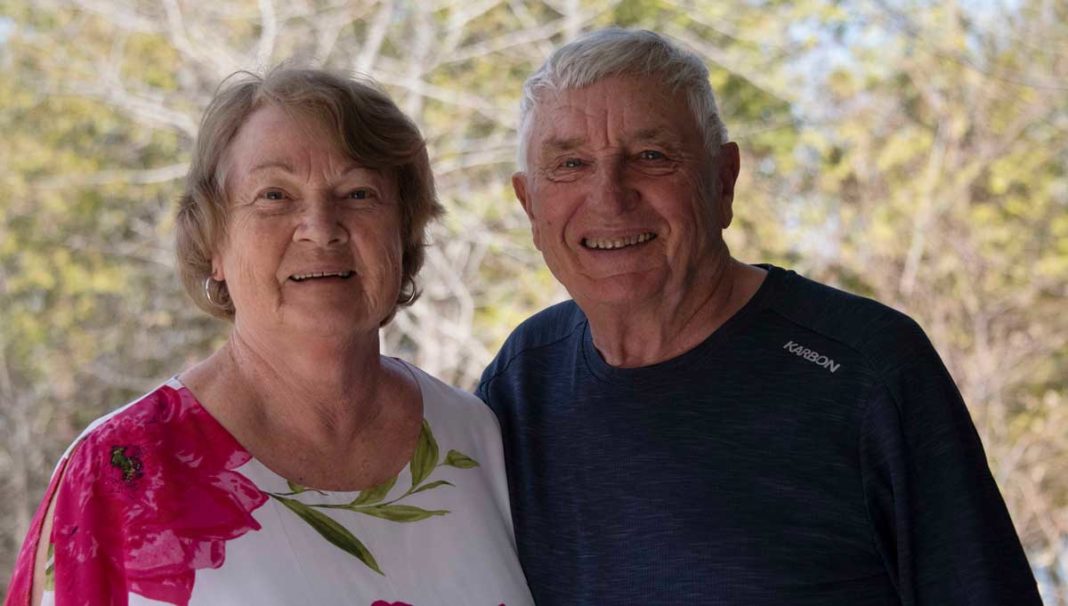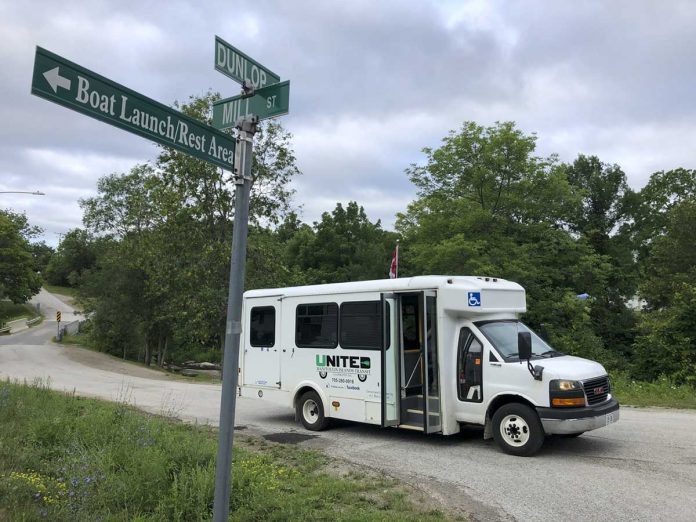Darrell and Marlene Dewar
After brief introductions, the writer is treated to a delicious lunch consisting of homemade bread with salmon salad and a dessert of homemade date squares. We sit outside, warmed by the sun as the story begins. Darrell and Marlene, both long-time members of the Manitoulin community, come from well-established close-knit farming families. “Our family did everything together, whether it was working on the land or visiting Watson’s store,” Marlene offers. As a teen, she worked on the local switchboard, and helped in Mae Russell’s restaurant. Later she worked for the Bank of Montreal, both in Sudbury and on the island. Darrell’ first job was with the Department of Highways building up the roadway from Espanola to Little Current before he started with INCO, spending 30 years, surveying their vast territories.
“My maternal grandmother Matilda McMullen was a kind lady,” Marlene begins, “she was always giving something to us, and we loved to visit. She made our wedding cake. Grandfather had a sawmill in Manitowaning, but he died when I was still a baby, so I don’t remember him. Dad came from a large family too. Paternal grandfather James Case died quite young. Dad’s mum lived with a son in the Slash.”
Marlene Ella was born in the Red Cross Hospital in Mindemoya on July 25, 1945, to William Hiram and Ethel (McMullen) Case. “I was named after my aunt Ella.” There were six siblings in the family, Burton, Vilda, Rex, Bill, Marlene, and Dennis. “I can still see my mother coming across the bridge towards our house. Dad was with her and she was carrying our new baby brother, Dennis in her arms. It was 1948.”
“Our first farm in the Slash was small, so in 1937, our family packed up five children and all our belongings to move to the 200-acre Bill Arnold farm on the banks of the Manitou River, in Sandfield. We had many trees, waterfalls, and each spring, we caught lots of suckers in the river. Mother would can them with tomato juice and vinegar. They tasted and looked just like salmon.”
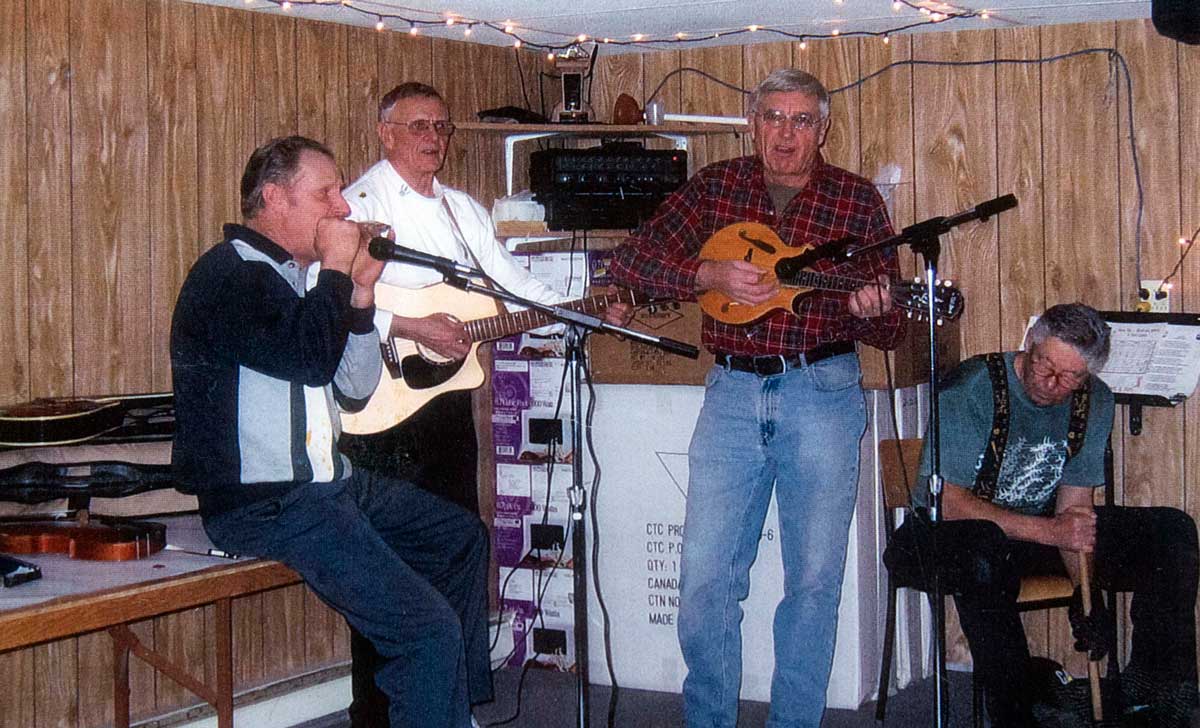
Historically, the Anishnaabe folk on Manitoulin showed earlier generations of pioneers how to use maple syrup and beech nuts, plentiful on Manitoulin. The nuts were ground into flour and animal feed and their wood, warmed houses. Without the beech nuts and suckers for food, many early pioneers might not have gotten through those first years.”
The family had sold some of the machinery to help buy the new farm, so Joe and Lark, their horses, became the source of power. “We had a cozy house, warmed by a wood-fired stove. A convenient hand water pump was installed at one end of the kitchen counter.”
“Dennis and I played together; we were like a second family, born quite a bit after the first four. We would fish the river for speckled trout. I was always happy being with him. We accompanied our parents everywhere. When I started at Big Lake School, three years later, another world opened to me. I rode on a school bus, saw other children and met a teacher, Sarah Cannard, for the first time. I liked math, art and recess the best but there were a lot of rules. If we misbehaved, we missed recess; needless to say, I didn’t misbehave.”
For high school, grade nine was held downstairs in the Mindemoya Community Centre because the old school was not big enough. The following year a new school was built where the public school is now. Marlene spent her high school years working at ‘Gram’s’ restaurant owned by Mae Russell. She was both a waitress and a switchboard operator there as “Central” for the local rural telephone company was also located in the same building as the restaurant.
“My brother Bill would take me to the dances if I promised to iron his pants. Dances were opportunities to meet new people, like Darrell. He was bestowed with a great sense of humour and wonderful dancing skills, which more than made up for the occasional ill temper.” Darrell saw a “pretty lady with a nice figure and who could move well on the dance floor.”
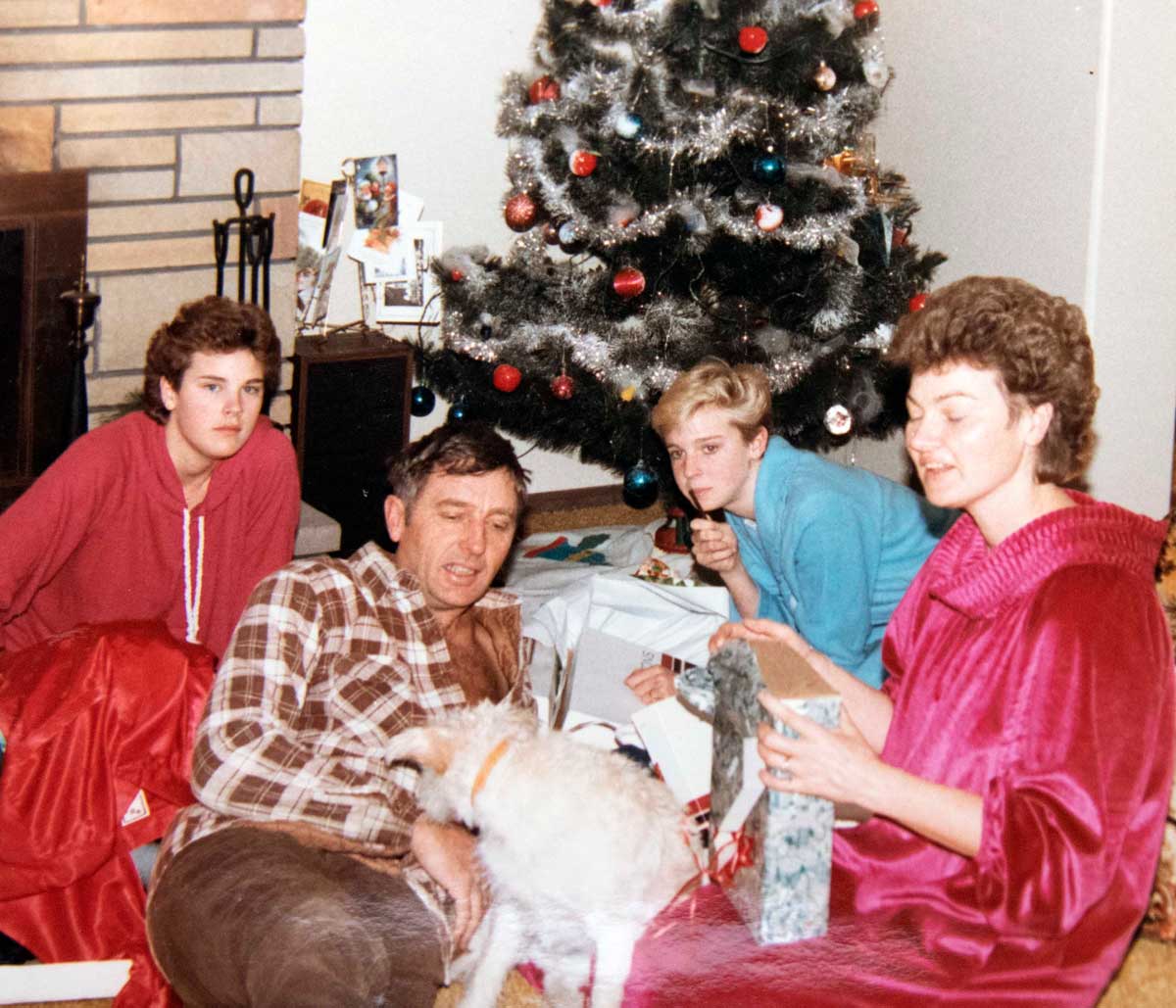
“We began to spend time together, enjoying bands like the Gore Bay Orchestra.” Sometimes there was a little ‘partying’ going on at the wood pile at the Sandfield Hall beside Watson’s store. The boys might congregate before or after the dance. The girls didn’t participate. For the ladies ‘no drinking’ was the norm, it seems, until after the wedding bells had rung.
Water-skiing was just gaining traction, so the couple often took a picnic lunch and joined their friends on the beaches of Lake Mindemoya or Martin Lake. “My cousin had a boat with a motor,” Darrell adds. Providence Bay had a quiet, unpopulated beach where you might be the only couple enjoying the ambience. During their early dates, Marlene perceived a little ‘reticence’. Darrell quickly explains, “I waited for 11 dates to kiss her because I was shy.”
“Paternal grandparents are William and Harriet (Kay) Dewar,” Darrell offers as introduction. “William had come with other youths, as a 12-year-old from Scotland, to work on a farm in Collingwood. A few years later, he moved to the Kennedy farm in Providence Bay. Harriet lived on the 20th and 8th Side Road and walked three miles to school each day. At 15, she cooked for the commercial fishermen on the Duck Islands. After World War One, William had the foresight to plant acres of potatoes which were shipped overseas. One hundred-pound bags sold for $10 each to feed the German people after they had lost the war and their crops. This gave William the impetus he needed to invest in his farm.”
Maternal grandparents James and Alice (Cooper) Hopkin were wise and kind. They lived where the Garden’s Gate restaurant is now. “Grandmother cooked at the hotel in Providence Bay, and she was the book-keeper in the family, making sure their money was well-spent. Grandfather had taken a few years of Veterinary School at Owen Sound, so he cared for the animals.”
Darrell was born on June 8, 1940 to Reginald and Grace (Hopkin) Dewar. “There was a $200 charge for a baby and a $100 charge for a galloping colt at the time,” Darrell adds, smiling. “I was the second son, after Harold and before Lyle. All of us being five years apart, was well-planned. We would help father without the fighting that might have occurred were we closer in age. My first memory, as a three-year old, is riding on Aunt Hazel’s shoulders to visit Aunt Maude. Aunt Hazel had blonde hair and looked like a movie star. I was enthralled.”
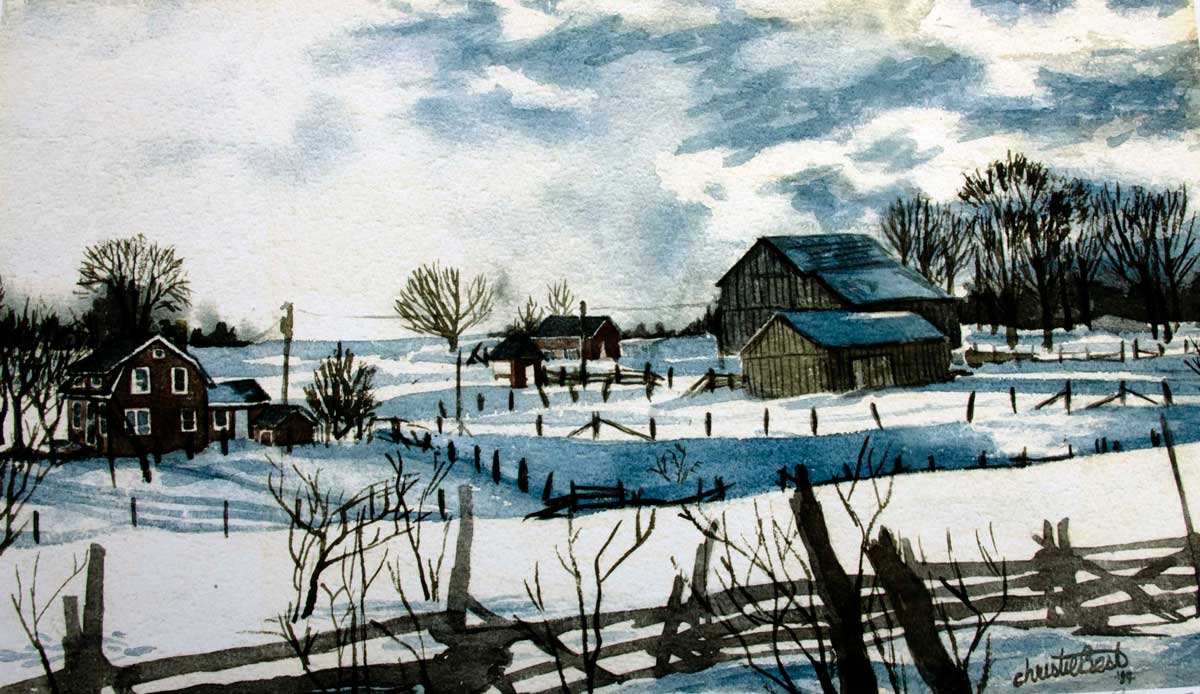
“School was two miles away on the Government Road. Our supply teacher, Mrs. Corrigan liked to read us stories that could last for half a day. We loved it. A bonus was her habit of napping at lunch. If she happened to be asleep when it was time to ring the afternoon bell, we took great pains not to wake her.” At home, Lyle and Darrell took up fiddling after listening to Chester Glanville, their hired hand, play his violin. Harold preferred the guitar.
“In April 1950, my dad, Jack Dewar, Ivan Lanktree and Cliff McCulligh fashioned a snowplough using discs, bobsleighs and oak wing boards. They successfully met the deadline for clearing the Government Road of snow, so Hydro could come in. Life became much easier after that.”
In 1951, Darrell was bused to Providence Bay School where Miss Annie McDermid, who had taught his parents, made sure they followed all the rules. “One year we cut down a Christmas tree at her request. It was our choice to cut one three stories high. She got us back by insisting we shorten it, then cut and stack the extra wood. We learned not to cross her but learned a lot of other valuable information as well.”
“The high school was impressed with Miss McDermid’s students. Nevertheless, this learning advantage dissipated somewhat by grade ten when girls and cars changed priorities. There was also an understanding that the grandchildren of William and Harriet Dewar would take their girlfriends and cars to them to seek their approval,” Darrell adds, grinning. If the Dewar grandparents were happy, the new acquisitions and connections were adopted.
After Grade 10, Darrell worked for the Department of Highways, for $179 a month, building Highway 6 from Espanola to Little Current. “This is where I learned the art of surveying.” Darrell finished Senior high at night school. After grade ten, Marlene became a teller with the Bank of Montreal.
“Darrell and I set the wedding date, and I headed for Sault St. Marie to pick out the perfect wedding dress. The day before we were to marry, we discovered that the dress had gone to Sandfield, Manitoba. We rushed to the Sault and were assured that any dress that fit, could be substituted. A beautiful ‘second choice’ was picked.” Darrell and Marlene were wed on a nice, warm November 15, 1963. The honeymoon took them to Ottawa where they made an adventurous turn and wound up in Hull. “We were lost, and it took us quite a while to get back since everyone spoke French. Coming back to Ontario was like coming back to Canada from a foreign country.”
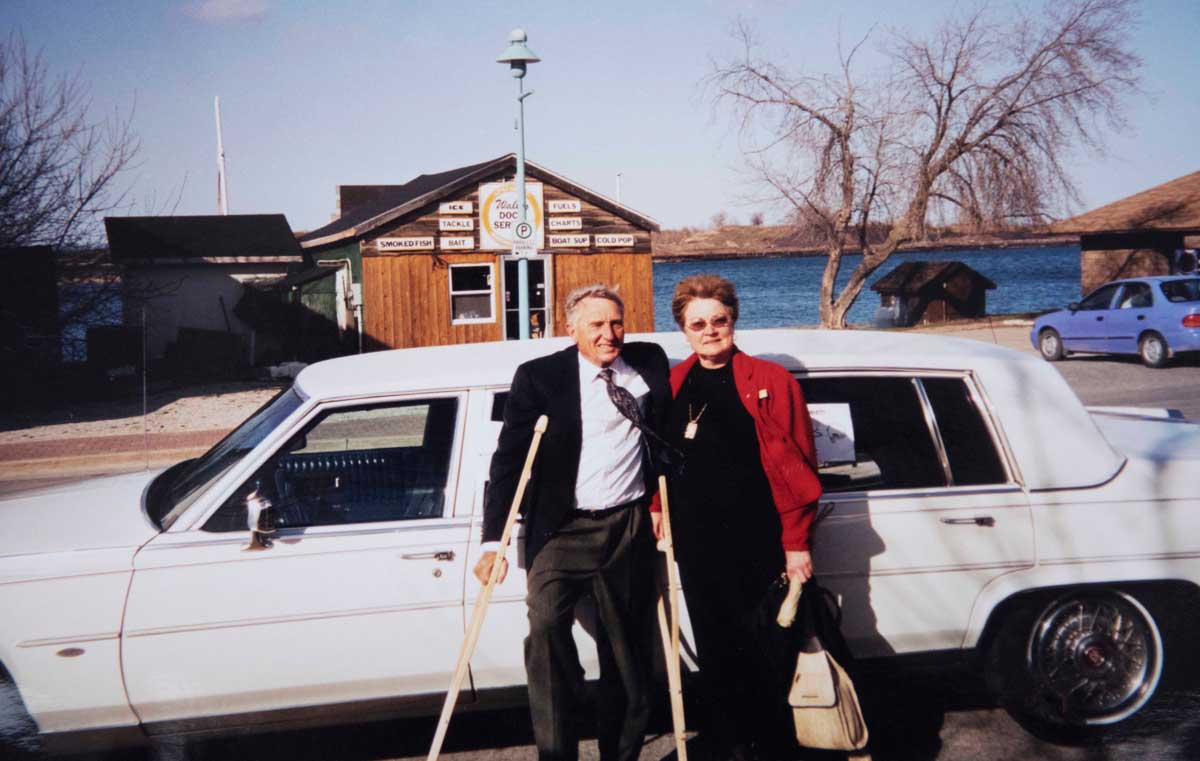
In 1964, the couple moved to a rented home on Beverly Drive in Sudbury where Marlene would work with the Bank of Montreal and Darrell at INCO. “My brother knew the guy that headed the INCO surveying group. They agreed to interview me but then a serious car collision on Government Road laid me up for several months. I anticipated a refusal, but to my surprise they still had the job open. ‘Come when you are ready’ they said.”
On November 9, 1964, Darrell began setting up machinery to do precise leveling on INCO’s vast lands, extending for many of miles to the Spanish River area where there were three powerhouses near the logging town of Biscotasing. “The department consisted of 12 staff, four teams of three, with one team always in the office. There was a lot of driving and preparatory work and this kept us quite busy.”
In 1965, Marlene’s dad died. Brother Dennis was just 17. It was quite a shock for the family, but life went on. In 1968, the couple’s first baby, Anita Marie was born. “We were still living in the apartment on Beverley Drive. Anita was active right from the start. She would only stand in her crib. A cardboard top on the crib was needed so she would sleep instead of stand. She walked at seven months and used her spring-loaded jumping horse to vigorously explore the entire house. She loved all sports.”
In 1969, Darrell and Marlene built a home on Field St. in Walden. “My dad and I, and some helpers cut the logs which were cut in Albert Davis’ sawmill in Providence Bay. Bev McFarland was the carpenter. We moved in July. The subdivision of young families was safe, so you could leave your doors open. Curling became an enjoyable pastime for both of us.”
“In 1972 Valerie Ann was born. Both girls were wonderful, driving me to distraction one minute and being very helpful in the next,” Darrell confides. “I often got sleepy when I was driving so the girls would make sure I stayed awake. Sometimes they would sit on my knees, take the wheel and do the steering on the last leg of our journey. As a result, they became excellent drivers. They also learned to do all tasks that boys are trained for. They could change tires and check the oil. If they took the car out, they had to check all fluid levels first. If I didn’t hear the slam of the hood, they wouldn’t get the car next time.”
“I enjoyed them even more as teenagers because I could talk to them with more maturity and they would confide in me, asking questions about boys that I could answer,” Darrell continues. “They were also taught to use a saw and other tools. Marlene instilled domestic competence. She also enrolled them in an Etiquette course (Charm School) to ensure a grasp of the feminine aspect of their youthful knowledge.
“One day, when they declared they were bored, I suggested we go to the cottage and clear away some of the dead trees. They reluctantly took on this assignment which could keep them occupied for quite a while. Life took a new turn. Marlene and I would get ready to go out only to realize the car was missing. We had to strategize the optimal use of the vehicle for all our benefits.”
In 1985, Valerie was 13. Marlene and Darrell took her and her friend to the east coast of Canada, going through Quebec and old Quebec City. “Both of them were laying in the back, preoccupied in their own bubble and they missed much of the beautiful scenery and the famous landmarks. Nevertheless, they had a good time, even after I nearly broke my leg trying to turn off an unsuitable movie that a former guest had paid for, only to realize they had already seen part of it.”
“They were good kids. Sunday morning was church time and they had to be there even if Saturday night had been a late one. We suspect they slept in their clothes occasionally, but they always made it to church. The girls worked at Timberlane Lodge on Lake Manitou for a few summers when the Bushey’s owned it, getting to and from the lodge by boat.”
Darrell worked for INCO as a surveyor for 30 years less nine days. After both retired, Darrell and Marlene enjoyed some travelling. “Our best trip was a cruise to the Holy Land for my sister’s 50th wedding anniversary.” Marlene reminisces. “My brother organized the trip and when our sister arrived at his stateroom to see all her siblings, she and her hubby were so surprised, you could have knocked them over with a feather.”
“The South Africa excursion was memorable. Jeeps left twice a day to find animals on the game reserve. We also travelled to Russia, the Baltics, and the Ukraine. In the States, we travelled from Ontario to Florida, to the west coast, then up to British Columbia, before going back to Ontario, about 10,000 miles.”
“An important event in our lives? The day we married and the births of our children.” “Favourite pets? On our seventh anniversary the girls got us a dog and we became quite attached to Tuffy. One time, his enthusiastic barking prevented a policeman from getting too close during a ‘stop and check’ near Manitowaning.”
“Something unusual that the kids did? Darrell shares, “Valerie knew that her mum came home tired from the bank. Marlene would put her feet up, enjoy a glass of wine and fall asleep. Valerie had to respect her midnight curfew. After her mum fell asleep, Valerie would turn all the clocks in the house back one hour. Her mother would see her coming in at midnight and be happy. During the night, Valerie would change all the clocks back to the right time. It took many weeks before the ‘gig’ was up, and Marlene realized what was really happening.”
Today Val lives in Oshawa with her family. She is a liaison worker for street kids dealing with the police and the court system. Val and her hubby have two children, both fine young people. Sydney is a social worker and Ian is at university studying financial Management. Anita is a retired Recreational Therapist who spent many years at the Laurentian Hospital in Sudbury.
“Collections? I have over 100 spoons purchased during our travels, mounted on a rack. Darrell has several fiddles.” “What are my strengths? Darrell responds, “Playing the fiddle and the mandolin. I used to play with the ‘Islanders’ for the seniors, with two of my brothers. In Walden, we were part of the ‘The Walden Rovers.’ Marlene enjoys sewing, knitting, cooking and her role as ‘financial minister’ in this home.”
“Hobbies? We like phone visits with older single people who don’t get to go out. We know most people around here and can discuss experiences we have in common with them.” “What would we still like to achieve? Catch that 20 lb. lake trout through the ice and stay out of the old age home,” Darrell confirms.
“What are we most afraid of? Darrell quickly says ‘mice’ and Marlene, ‘snakes.’” “If you could go back in time, is there something you would do differently? Darrell says, “I should have listened to my parents who said, ‘You have the ability to excel in school’. I did adhere to this recommendation until I got my driver’s license and met girls. I could have become a mechanical engineer.” Marlene adds, “I could have become a bank manager earlier.”
“Did anyone inspire you along the way? Darrell responds, “Chester Glanville, our hired hand on the farm. He played violin very well in the 1950s. Mum would chord on the piano. If I could play like Chester, I would not wish for anything else. He was just a regular guy, but my musical idol.” For Marlene it was her mother. “She could turn her hand to anything. She was a great cook, seamstress, and she could stretch a dollar a long way.” “Hope for the future? That our families’ good health and ours continues.” Recipe for happiness? Darrell, quips “men always need to have the last word,….‘yes dear’. Allowing each other some freedom, family togetherness and trust.”
“I love where we live at this point in my life.” Marlene responds when asked about Manitoulin. “I enjoy the solitude when going for a walk. I love the neighbours and we are used to Island time, the unique environment, the distinctive services, even the ‘grapevine’. You are surrounded with water and can swim when and where you want. This is a great place to be during a pandemic. We wouldn’t live anyplace else.”

